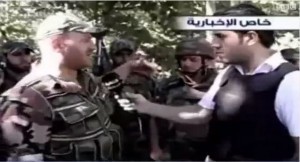Darayya Massacre: Waiting for the Truth

“It’s the least I can do for my country.” That was the last thing my childhood friend Ali said when we spoke by phone on August 14, just before he joined the Syrian army.
Ali was called up by the elite Fourth Armoured Division. This unit, led by Maher al-Assad, the president’s brother, is one of the toughest and best-equipped in the army. It is well known for its fierce allegiance to the regime and for spearheading the campaign against both branches of the opposition – armed and pacifist.
The Fourth Division is doing the regime’s dirty work and committing massacres. The regime is relying on it for its own survival. It recruits the division’s troops from the Alawite community, so if this unit were wiped out, it could lead to a never-ending sectarian war.
I do not, however, believe that all members of the Fourth Division are bloodthirsty criminals. There must be many among them who, just like Ali, have humanity and believe in defending their country, but who have found themselves facing a difficult choice – either to support a despotic, corrupt regime, or to back a revolution whose direction is no longer clear since it became militarised.
Ali does not trust the revolution, but he does not support the regime, either.
He is in his early thirties, educated – a university graduate – kind, with a good sense of humour. His background is a village on the coast, but his family moved to Damascus before he was born. We grew up together in a poor neighbourhood in Damascus, where people of different faiths share love and poverty.
When we were children, Ali was good at all kinds of games, from marbles to football. As teenagers, his friends used to take advantage of his youthful appearance to borrow horses from the Eid holiday carnival. The horse’s owner would hand it over to Ali without supervising him, in the belief he was too young to ride it. But Ali was an excellent rider, and would keep the horse for hours and ride it with his friends, who could not afford to pay to hire it. Ali would then sneak the horse back into the carnival yard.
When I left Syria a few months ago, there was no one but Ali I would entrust with caring for my mother and looking after everything I left behind.
At the start of that phone conversation, I begged him to cross the border and come and join me. I wanted him to save himself both from getting killed and from shedding other Syrians’ blood. He refused to do so. He said he would place himself in the hands of fate, and his blood would be an acceptable price for protecting his homeland.
On August 25, the Fourth Division went into the town of Darayya in the countryside surrounding Damascus. A massacre took place. Some estimates say up to 700 people died. The opposition in Darayya had been among the most pacifist-minded in the country, making this town an example to the rest of Syria.
It was reported that the massacre happened when negotiations on a prisoner exchange between the regular army and the Free Syrian Army failed. Very little is known about the massacre, except what was said on pro-opposition websites and in the shameful reports in the regime’s media. The most infamous of the latter was a sickening report by Al-Dunya TV reporter Micheline Azar. As the footage showed dead bodies with shattered heads, and children lying alive by their mothers’ corpses, Azar asked one of them, “Who did this to your mother, dear?”
I suddenly remembered that Ali had joined that army division. Gruesome thoughts came to me – did Ali shatter one of these heads? Could he have killed one of these mothers?
It is possible that Ali was sent to Darayya, but it is impossible that he could have been among those who committed these atrocities.
If Ali survives the war, he will have a lot to tell us. If he does not, I will consider him a martyr.
